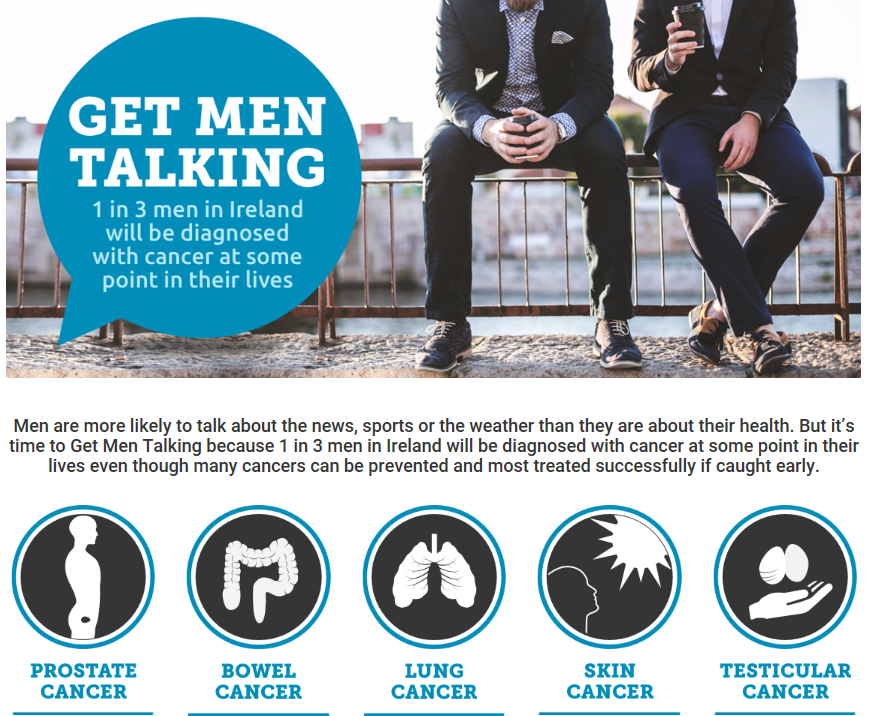It’s time to get men talking and open-up the conversation around cancer
Helen Forristal, Director of Nursing Services at the Marie Keating Foundation, says “it’s time to get men talking”, encouraging men to talk about their health and make better lifestyle choices means more men will reduce their risk of cancer and seek help when needed.
Recent research published in the Irish Medical Journal in relation to prostate cancer revealed that often the most common coping strategy of men was to “just deal with it”[1]. But this can lead to feelings of isolation, a delay in diagnosis and significant emotional and psychological impacts. It also means that for many men, the everyday conversations about cancer prevention that are crucial, don’t take place.
Research undertaken by the Marie Keating Foundation in 2016 found that three in four men in Ireland have never talked to their GP about cancer and one in two men have not spoken to a family member or friend about the disease.
Given that four out of ten cancers are preventable, opening up the conversation around cancer and cancer prevention amongst men is crucial. But what are the most common cancers affecting men?
The cancers that most often affect men in Ireland are prostate, bowel, lung, and skin cancers. Testicular cancer is the most common cancer in men aged 15-34. Knowing about these cancers, what to look out for and what you can do to find them early (when they are small and easier to treat) may help save your life.
Prostate cancer
Prostate cancer is the most common male cancer in Ireland after skin cancer. One in eight men here will be diagnosed with it. Your chances of getting prostate cancer go up as you get older so if you’re over 50, talk to your GP about the PSA blood test every year. It’s quick and it’s simple.
Prostate cancer can run in families. You need to be extra sure to talk to your GP about prostate cancer and the PSA blood test if your father, brother or uncle has had prostate cancer. You should also get your PSA levels checked if your mother or sister has had BRAC 1 or BRAC 2 breast cancer- this is the type of breast cancer that is caused by the ‘Angeline Jolie gene.’
Bowel cancer
Bowel cancer is one of the most common cancers in Ireland. Over 1,440 Irish men are diagnosed with it every year.
It’s also known as colon cancer, rectal cancer, or colorectal cancer – depending on where in the bowel the tumour is.
Bowel cancer is usually diagnosed in people over the age of 55.
Your chance of developing bowel cancer is increased if you drink alcohol, smoke, are overweight, do not exercise, and eat a lot of red meat or processed foods.
Bowel cancer can be hereditary. If someone in your family has bowel cancer, you have a higher chance of developing it.
BowelScreen – The National Bowel Screening Programme offers free home test kits to men and women in Ireland aged 60 to 69 every two years. The BowelScreen programme will, over time, be offered to all people aged 55 to 74.
Lung cancer
Of all the cancers, lung cancer is the biggest killer in Ireland.
Nearly 1,300 men are diagnosed with lung cancer every year in Ireland. Most lung cancers are due to smoking so if you do smoke, quit now. Visit Quit.ie or Freephone 1800 201 203
Lung cancer doesn’t display many symptoms in its early stages. But once the cancer develops, it will start to affect the lungs, and the symptoms may include:
- A persistent, worsening cough
- Coughing up excessive phlegm with blood
- Chest pain with coughing or breathing
- Recurring chest infections
- Weight loss
Skin cancer
Women are more likely to get skin cancer than men. But men are more likely to die from it.
Skin cancer is the most common cancer in Ireland. You can prevent skin cancer by being SunSmart:
- Always wear sunscreen
- Sunscreen with UVA and UVB protection
- Avoid the sun between 11am and 3pm
- Wear protective clothing
- Never, ever use sunbeds
Check your skin regularly to see if any of your moles or freckles have changed in colour or size. If they have, talk to your GP straight away.
Testicular cancer
Testicular cancer is the presence of cancer cells or a cancerous growth in or on the testicles.
Testicular cancer is the most common cancer in young men aged 15-34. However, it’s actually very rare and it’s very treatable if caught early enough.
You can’t do anything to prevent it but you can catch it early. That’s why you should check your testicles every month to make sure they are smooth, firm and comfortable. They should not feel lumpy or painful.
Remember, most abnormalities or lumps in your testicles turn out not be cancer, but if you notice anything unusual, get it checked out by a doctor straight away to make sure.
So what can men do to improve their health and reduce their cancer risk?
- Get talking– Speak to your GP about the PSA test if you are over 50 years of age
- Get active– exercise for at least 30 minutes a day
- Get SunSmart– Seek the shade, wear at least SPF 30 at least and never use sun beds
- Get checking– Check your testicles once a month. They should be smooth and painless
- Get screened– If you are between 60 and 69 years of age, take part in BowelScreen
- Get a balanced diet– Eat plenty of fruit and vegetables. Cut down on red meat and sugar
- Get less pints– The less alcohol you drink, the better. Have alcohol-free days.
- Get smoke free– if you smoke, quit now. Freephone the HSE Quitline on 1800 201 203 or Free text 50100
[1] http://imj.ie/suicide-risk-associated-with-a-prostate-cancer-diagnosis/
